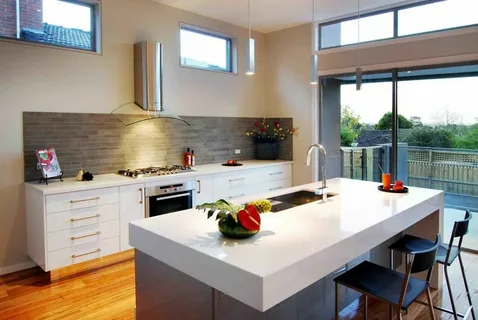Choosing the right surface for your kitchen can be a game-changer in both style and functionality. The kitchen benchtop is one of the most frequently used areas in any home, so it’s essential to select a material that balances beauty, durability, and budget. Here are the top 7 materials to consider for your next kitchen benchtop, each with its own unique benefits.
1. Quartz
Engineered quartz is a popular choice for modern kitchens. Made from natural quartz particles bound with resin, this material offers a sleek finish, high durability, and excellent stain resistance. It’s non-porous, making it hygienic and low-maintenance — ideal for busy households.
Pros:
- Wide range of colors and patterns
- Scratch and stain-resistant
- No sealing required
Cons:
- Can be more expensive than other materials
- Sensitive to high heat
2. Granite
Granite remains a timeless favorite for homeowners looking for a natural stone surface. Each slab is unique, adding a touch of luxury and individuality to your kitchen.
Pros:
- Extremely durable
- Heat and scratch-resistant
- Adds real estate value
Cons:
- Requires periodic sealing
- Can be costly
3. Marble
For those seeking elegance and classic appeal, marble is an excellent option. Its natural veining and soft color palette make it a statement piece in any kitchen.
Pros:
- Timeless aesthetic
- Cool surface, great for baking
- Unique natural patterns
Cons:
- Prone to staining and scratching
- Requires regular maintenance
4. Laminate
If you’re looking for affordability without compromising on style, laminate is worth considering. Modern laminates can mimic the appearance of more expensive materials like stone or timber.
Pros:
- Budget-friendly
- Wide range of designs
- Easy to install and maintain
Cons:
- Less durable than stone
- Vulnerable to heat and moisture
5. Concrete
Concrete benchtops have gained popularity for their industrial look and versatility. They can be customized with pigments, stains, or even embedded objects.
Pros:
- Highly customizable
- Durable and strong
- Unique appearance
Cons:
- Requires sealing
- Can crack over time
6. Timber
For a warm, organic feel, timber is a great choice. It brings natural charm and character to the kitchen, especially in rustic or country-style designs.
Pros:
- Renewable and sustainable
- Can be sanded and refinished
- Adds warmth to any space
Cons:
- Requires regular sealing
- Sensitive to water and heat
7. Stainless Steel
Commonly used in commercial kitchens, stainless steel is also making its way into residential spaces for its clean, modern appeal.
Pros:
- Heat and stain-resistant
- Hygienic and easy to clean
- Industrial-chic aesthetic
Cons:
- Can scratch and dent
- Shows fingerprints easily
Final Thoughts
When planning your renovation, reviewing the top 7 materials to consider for your next kitchen benchtop can help narrow down the options based on your lifestyle and design preferences. Whether you’re drawn to the sleekness of quartz, the luxury of marble, or the practicality of laminate, there’s a benchtop material suited to every kitchen and budget.
Remember, the top 7 materials to consider for your next kitchen benchtop aren’t just about looks — they also play a vital role in how your kitchen functions daily. Choose wisely, and you’ll enjoy both style and substance for years to come.



